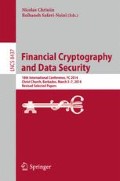Abstract
Many companies have recently started to offer wearable computing devices including glasses, bracelets, and watches. While this technology enables exciting new applications, it also poses new security and privacy concerns. In this work, we explore these implications and analyze the impact of one of the first networked wearable devices—smartwatches—on an academic environment. As a proof of concept, we develop an application for the Pebble smartwatch called ConTest that would allow dishonest students to inconspicuously collaborate on multiple-choice exams in real time, using a cloud-based service, a smartphone, and a client application on a smartwatch. We discuss the broader implications of this technology, suggest hardware and software approaches that can be used to prevent such attacks, and pose questions for future research.
Access this chapter
Tax calculation will be finalised at checkout
Purchases are for personal use only
References
ACT, Inc., What should I take to the test center? (2013). http://www.actstudent.org/faq/bring.html
Arthur, C.: Dell eyes wearable computing move as PC business keeps slumping. The Guardian (2013). http://www.theguardian.com/technology/2013/jul/04/dell-wearable-computing-pc-business
Cizek, G.J.: Cheating on Tests: How to Do It, Detect It, and Prevent It. Routledge, New York (1999)
Denning, T., Matuszek, C., Koscher, K., Smith, J.R., Kohno, T.: A spotlight on security and privacy risks with future household robots: attacks and lessons. In: Proceedings of the 11th International Conference on Ubiquitous Computing, Ubicomp ’09, pp. 105–114 (2009)
Educational Testing Service. On test day (2013). http://www.ets.org/gre/revised_general/test_day?WT.ac=grehome_gretestday_130807
Fitbit, Inc., Fitbit Force (2013). http://www.fitbit.com/
Frary, R.B., Tideman, T.N., Watts, T.M.: Indices of cheating on multiple-choice tests. J. Educ. Behav. Stat. 2(4), 235–256 (1977)
Google. Google Glass (2013). http://www.google.com/glass/start/what-it-does/
Halderman, J.A., Waters, B., Felten, E.W.: Privacy management for portable recording devices. In: Proceedings of the Workshop on Privacy in the Electronic Society, pp. 16–24 (2004)
Harpp, D.N., Hogan, J.J.: Crime in the classroom: detection and prevention of cheating on multiple-choice exams. J. Chem. Educ. 70, 4 (1993)
Hochet, B., Acosta, A.J., Bellido, M.J. (eds.): PATMOS 2002. LNCS, vol. 2451. Springer, Heidelberg (2002)
Hong, J.I., Landay, J.A.: An architecture for privacy-sensitive ubiquitous computing. In: Proceedings of the 2nd International Conference on Mobile Systems, Applications, and Services, pp. 177–189. ACM (2004)
Kagal, L., Finin, T., Joshi, A.: Trust-based security in pervasive computing environments. Computer 34, 12 (2001)
Langheinrich, M.: Privacy by design–principles of privacy-aware ubiquitous systems. In: Abowd, G.D., Brumitt, B., Shafer, S. (eds.) UbiComp 2001. LNCS, vol. 2201, pp. 273–291. Springer, Heidelberg (2001)
McWhirter, C.: High-tech cheaters pose test. Wall Street J. (2013). http://online.wsj.com/news/articles/SB10001424127887324069104578529480125489370
Narayanaswami, C., Kamijoh, N., Raghunath, M., Inoue, T., Cipolla, T., Sanford, J., Schlig, E., Venkiteswaran, S., Guniguntala, D., Kulkarni, V.: IBM’s Linux watch, the challenge of miniaturization. Computer 35(1), 33–41 (2002)
Osborne, C.: How do students use tech to cheat? (2012). http://www.zdnet.com/blog/igeneration/how-do-students-use-tech-to-cheat/14216
Saponas, T.S., Lester, J., Hartung, C., Agarwal, S., Kohno, T., et al.: Devices that tell on you: privacy trends in consumer ubiquitous computing. In: Usenix Security, vol. 3, p. 3 (2007)
The College Board. SAT test day checklist (2013). http://sat.collegeboard.org/register/sat-test-day-checklist
Wagner, D., et al.: Security and privacy for wearable computing. Panel discussion (2008). https://www.usenix.org/conference/hotsec13/security-and-privacy-wearable-computing
Wong-Anan, N.: Watch out! Thai exam cheat triggers phone-watch ban. Reuters (2008). http://www.reuters.com/article/2008/03/05/us-thailand-cheating-idUSBKK4207420080305
Acknowledgements
The authors wish to thank Martin Strauss for insightful guidance and Phil and Jill Migicovsky for early help and feedback. This work was supported in part by the National Science Foundation (NSF) under contract numbers CNS 1111699 and CNS 1255153.
Author information
Authors and Affiliations
Corresponding author
Editor information
Editors and Affiliations
Rights and permissions
Copyright information
© 2014 International Financial Cryptography Association
About this paper
Cite this paper
Migicovsky, A., Durumeric, Z., Ringenberg, J., Halderman, J.A. (2014). Outsmarting Proctors with Smartwatches: A Case Study on Wearable Computing Security. In: Christin, N., Safavi-Naini, R. (eds) Financial Cryptography and Data Security. FC 2014. Lecture Notes in Computer Science(), vol 8437. Springer, Berlin, Heidelberg. https://doi.org/10.1007/978-3-662-45472-5_7
Download citation
DOI: https://doi.org/10.1007/978-3-662-45472-5_7
Published:
Publisher Name: Springer, Berlin, Heidelberg
Print ISBN: 978-3-662-45471-8
Online ISBN: 978-3-662-45472-5
eBook Packages: Computer ScienceComputer Science (R0)

